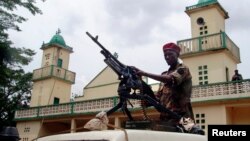GENEVA —
The International Committee of the Red Cross (ICRC) reports calm has been restored to Bangui, the capital of the Central African Republic (CAR). But, the ICRC warns the risk of looting and renewed fighting remains high. Last month rebels swept into Bangui and ousted President Francois Bozize.
The ICRC reports it is relatively calm in the capital city, but things are far from normal after rebels took control following heavy fighting last month. It says water and electricity are back on. Shops, supermarkets and restaurants are open again.
But, it says the situation in Bangui is still very fragile and unstable and people live in the fear of renewed looting and clashes among armed men.
The ICRC spokeswoman for Central and Southern Africa, Marie-Servane Desjonqueres, tells VOA that some 30 unidentified bodies, killed in the violence that broke out on March 23 and 24 in Bangui, have been buried by the Central African Red Cross. She says the ICRC and local Red Cross workers have been providing emergency aid to wounded people since then.
"The figures that we have today regarding the numbers of wounded is around 240 wounded people," she said. "The volunteers of the local Red Cross managed to evacuate around 110 seriously wounded persons to the hospitals. But, many more were helped during the violence. Around 400 received first aid or received some help from the volunteers. We do have access to those hospitals."
Desjonqueres says a surgeon and nurse have arrived in the CAR and currently are seeing how medical care can be improved and basic needs met for the population.
She says security is a big concern and the ICRC is negotiating with the authorities to guarantee the safety of aid workers so they can reach the people in need of help. Although conditions in Bangui are far from ideal, she notes the situation in the rest of the country also is problematic.
"If you take for example, Kaga Bandoro and Ndele, which are two towns north of Bangui - there the situation is quite tense and the pressure on humanitarian organizations is quite high," she said. "We had several vehicles stolen and the proliferation of armed men in those regions make it very difficult for us to work and to move and therefore to do our work, which is to be close to and to help the population that needs our support."
Desjonqueres says the security situation in Ndele has deteriorated so much that ICRC staff no longer can venture out into certain streets. Despite this, she says the ICRC has been able to put the city's broken water supply back into operation.
In addition, she says repair work on the city's 49-cubic-meter reservoir, which serves the city's 10,000 inhabitants, is almost completed and ICRC engineers are repairing leaking pipes and treating water to make it safe to drink.
She says the ICRC currently is assessing the medical situation in Bangui and general needs throughout the country. She says water, food, and shelter are priorities. She says the ICRC also is working to reunite unaccompanied children with their parents.
The ICRC reports it is relatively calm in the capital city, but things are far from normal after rebels took control following heavy fighting last month. It says water and electricity are back on. Shops, supermarkets and restaurants are open again.
But, it says the situation in Bangui is still very fragile and unstable and people live in the fear of renewed looting and clashes among armed men.
The ICRC spokeswoman for Central and Southern Africa, Marie-Servane Desjonqueres, tells VOA that some 30 unidentified bodies, killed in the violence that broke out on March 23 and 24 in Bangui, have been buried by the Central African Red Cross. She says the ICRC and local Red Cross workers have been providing emergency aid to wounded people since then.
"The figures that we have today regarding the numbers of wounded is around 240 wounded people," she said. "The volunteers of the local Red Cross managed to evacuate around 110 seriously wounded persons to the hospitals. But, many more were helped during the violence. Around 400 received first aid or received some help from the volunteers. We do have access to those hospitals."
Desjonqueres says a surgeon and nurse have arrived in the CAR and currently are seeing how medical care can be improved and basic needs met for the population.
She says security is a big concern and the ICRC is negotiating with the authorities to guarantee the safety of aid workers so they can reach the people in need of help. Although conditions in Bangui are far from ideal, she notes the situation in the rest of the country also is problematic.
"If you take for example, Kaga Bandoro and Ndele, which are two towns north of Bangui - there the situation is quite tense and the pressure on humanitarian organizations is quite high," she said. "We had several vehicles stolen and the proliferation of armed men in those regions make it very difficult for us to work and to move and therefore to do our work, which is to be close to and to help the population that needs our support."
Desjonqueres says the security situation in Ndele has deteriorated so much that ICRC staff no longer can venture out into certain streets. Despite this, she says the ICRC has been able to put the city's broken water supply back into operation.
In addition, she says repair work on the city's 49-cubic-meter reservoir, which serves the city's 10,000 inhabitants, is almost completed and ICRC engineers are repairing leaking pipes and treating water to make it safe to drink.
She says the ICRC currently is assessing the medical situation in Bangui and general needs throughout the country. She says water, food, and shelter are priorities. She says the ICRC also is working to reunite unaccompanied children with their parents.




